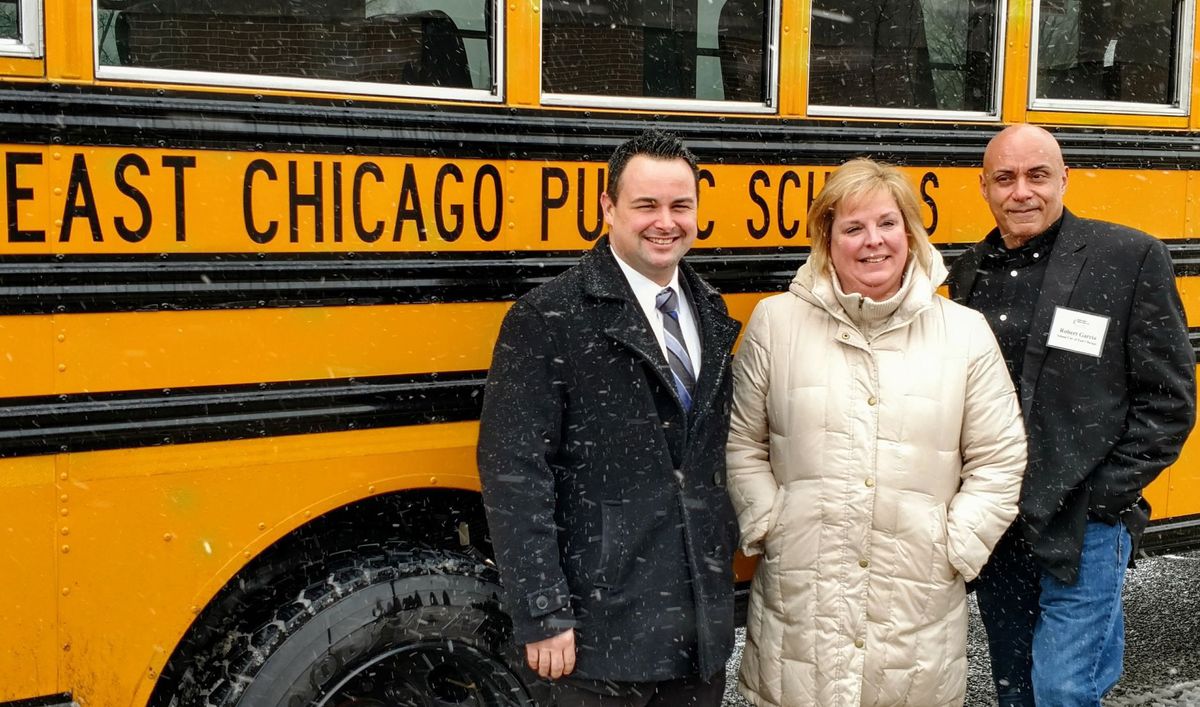Monday, March 20, 2017
EAST CHICAGO, Ill. (March 20, 2017) — East Chicago public school students are now riding to school on six new propane-powered buses, thanks in part to a grant awarded by BP’s Whiting Refinery, as reported in the Chicago Tribune last Friday. 
Paige McNulty, superintendent of East Chicago schools, remarked that when she came on board as new superintendent last August, the district already was planning to buy new school buses. McNulty said Transportation Manager, Robert Garcia, suggested the district compare the benefits of using propane-powered school buses versus diesel, and so the district investigated the two types of fuel.
"We decided that was the way to go," McNulty said last Monday. "It's more ecologically safe for our community with much less emissions. It also will save us money over time, about 60 percent less per bus than diesel fuel would normally cost."
"It's a win-win situation. The buses also are quieter and the drivers can hear much better. The buses are equipped with a GPS tracker, and we can track where the buses are and when they are idling. These buses also come with seat belts for our students. They require less maintenance because of the clean-burning propane meaning fewer oil changes. We now have a fleet of 37 buses and six of them are propane," McNulty said.
School officials said the propane-fueled buses will save an average of 60 percent, or $2,000 to $2,500 per bus, per year on maintenance costs.
ROUSH CleanTech designed, engineered and manufactured the six Blue Bird Vision Propane buses. The buses emit 80 percent fewer smog-producing hydrocarbons and emit no particulate matter when compared to diesel school buses.
The school buses began running in East Chicago in early March 2017 and are serving students in every school in the district. The School City of East Chicago serves approximately 4,100 students.
The funding for the school buses was provided in part by BP Whiting Refinery Cleaner Air through Diesel Emissions Reductions (CADER) grants, a program administered by South Shore Clean Cities.
The BP CADER program was created as part of a 2012 settlement agreement between BP’s Whiting Refinery and several environmental groups.
The program provided $450,000 through a grant process in 2013 and 2014 aimed at reducing diesel emissions in Lake County schools, municipalities, nonprofit hospitals, and county government. The goal was to improve air quality through projects that leveraged other funding sources to provide the greatest impact on public health.
The School City of East Chicago received almost $68,000 in grants, and South Shore Clean Cities Executive Director Carl Lisek presented the board with another $10,000 in September 2016 to help purchase the six new propane-fueled school buses.
(Photo: NWITimes.com. Pictured from left, Justin Mount, regional director for U.S. Sen. Joe Donnelly, East Chicago schools Superintendent Paige McNulty, and East Chicago schools Transportation Manager Robert Garcia, stand in front of one of six new propane school buses the school district acquired.)

Paige McNulty, superintendent of East Chicago schools, remarked that when she came on board as new superintendent last August, the district already was planning to buy new school buses. McNulty said Transportation Manager, Robert Garcia, suggested the district compare the benefits of using propane-powered school buses versus diesel, and so the district investigated the two types of fuel.
"We decided that was the way to go," McNulty said last Monday. "It's more ecologically safe for our community with much less emissions. It also will save us money over time, about 60 percent less per bus than diesel fuel would normally cost."
"It's a win-win situation. The buses also are quieter and the drivers can hear much better. The buses are equipped with a GPS tracker, and we can track where the buses are and when they are idling. These buses also come with seat belts for our students. They require less maintenance because of the clean-burning propane meaning fewer oil changes. We now have a fleet of 37 buses and six of them are propane," McNulty said.
School officials said the propane-fueled buses will save an average of 60 percent, or $2,000 to $2,500 per bus, per year on maintenance costs.
ROUSH CleanTech designed, engineered and manufactured the six Blue Bird Vision Propane buses. The buses emit 80 percent fewer smog-producing hydrocarbons and emit no particulate matter when compared to diesel school buses.
The school buses began running in East Chicago in early March 2017 and are serving students in every school in the district. The School City of East Chicago serves approximately 4,100 students.
The funding for the school buses was provided in part by BP Whiting Refinery Cleaner Air through Diesel Emissions Reductions (CADER) grants, a program administered by South Shore Clean Cities.
The BP CADER program was created as part of a 2012 settlement agreement between BP’s Whiting Refinery and several environmental groups.
The program provided $450,000 through a grant process in 2013 and 2014 aimed at reducing diesel emissions in Lake County schools, municipalities, nonprofit hospitals, and county government. The goal was to improve air quality through projects that leveraged other funding sources to provide the greatest impact on public health.
The School City of East Chicago received almost $68,000 in grants, and South Shore Clean Cities Executive Director Carl Lisek presented the board with another $10,000 in September 2016 to help purchase the six new propane-fueled school buses.
(Photo: NWITimes.com. Pictured from left, Justin Mount, regional director for U.S. Sen. Joe Donnelly, East Chicago schools Superintendent Paige McNulty, and East Chicago schools Transportation Manager Robert Garcia, stand in front of one of six new propane school buses the school district acquired.)

